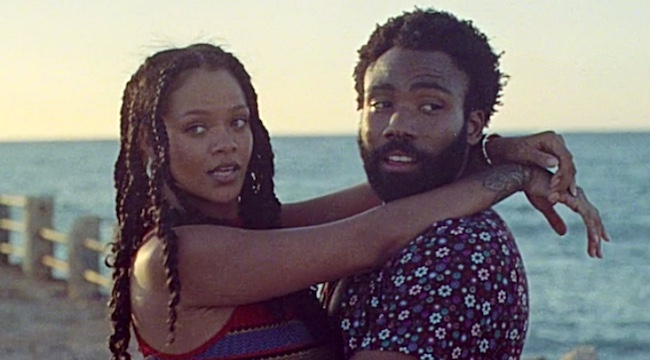
We are the things we leave behind. That simple truth has been in evidence through the entire month of April, thanks in large part to the tragic events of March 31, which left the world less one hip-hop luminary and an overall darker seeming place on the whole. The timing on the release of Donald Glover’s musical-thriller short film, Guava Island, almost couldn’t be eerier.
Two weeks after the death of Nipsey Hussle, an event that littered the sky with blue balloons and saw an outpouring of grief and celebration of a musical hometown hero, Guava Island provides a downright spooky mirror reflection of real life, tied to the echoes of mourning that followed Nipsey’s untimely passing by serendipitously spooky coincidence of a calendar’s turning. The film, shot eight months ago in Cuba and timed for release during Glover’s set as Childish Gambino at Coachella, becomes a statement about loss, the way we process grief, legacy, and the way music ties us all together and helps us to feel free.
Set on the film’s titular, possibly allegorical island, Guava Island follows Glover’s local celebrity musician Deni as he attempts to pull together a nighttime musical festival in defiance of his hulking, menacing boss, Red Cargo, who lords over the island’s citizens, making them work seven days a week at his factories and docks. The film has a lot to say about the ills of capitalism, the modern condition of which is poignantly summed up by pointed rejoinder from Deni (“Anywhere where in order to get rich, you have to make someone else richer is America”) and parodied by a stripped down performance of Gambino’s massively viral hit “This Is America.” Guava Island is full of both obvious and nearly invisible nods to the legacies of industrialism and colonialism, its setting a melange of accents and dialects, all simmered together in a stunning tropical paradise that none of the residents — save those most adjacent to the foreign dictates of American philosophy — have the time or means to enjoy.
Although the music of Childish Gambino is central to the film’s premise, it is not crucial to the plot. Glover’s songs “Feels Like Summer,” “Saturday,” and “Summertime Magic” also receive lavishly framed spotlights within the overall tale, but feel more like set pieces justifying his presence in the film’s plot and highlighting Deni’s importance to the people around him in his tightly-knit island community. The film owes as much visually to 2002 Brazilian crime drama City Of God as it does to Glover’s Atlanta; Glover’s Atlanta collaborator Hiro Murai directs Guava Island as somewhat of a homage to City Of God, without recklessly or needlessly recreating specific shots or moments. It’s a little bit of low budget, on location music video, a little bit prestige drama, and partially an episode of his and Glover’s critically acclaimed show, lovingly and painstakingly crafted, even if it is a bit lightweight compared to the works it draws most of it inspiration from.
I do wish that Rihanna, who stars as Deni’s girlfriend Kofi, was given more to do than simply react to Deni as he charms and cavorts on the beach with her, or look threatened by Red’s visitation when it becomes clear his strong-arm tactics haven’t derailed the festival as he hopes. Her opening narration sets the stage, then her character becomes something like a passive player, watching those around her create moments for themselves — like the delightful Leticia Wright, who plays Kofi’s coworker Yara and lights up the screen as she snatches moments of sheer joy from Deni’s songs on the radio when Red’s goons go on break. Rihanna’s big moment is saved for the end, during her final confrontation with Red, delivering one hell of a clapback after all his machinations end in tragedy for the island’s people.
It’s that final scene that draws the most immediate parallel to current events. Tragedy turns to celebration, a homegrown musical hero is feted, and most heart-wrenching, everyone is bedecked in dazzling blue in obvious opposition to the tyranny of Red Cargo. Seeing that final scene sent a shiver down my spine as I watched and rewatched the film, finding another thing to appreciate or focus on with each viewing. That final scene is about so many things: Redemption, appreciation, celebration, mourning, rebellion. It’s about music, and how music helps us to do all of those things and process all of those feelings. It’s about the enduring power and impact the people who create the music can leave on our lives long after they’re gone. And it’s about finding — or creating or stealing — our own paradise in the midst of a world seemingly designed to grind us down in the gears of the machines that drive commerce and greed. With all the ills of the world aligned against us, with music, with hope, with sacrifice, we can have our day.






